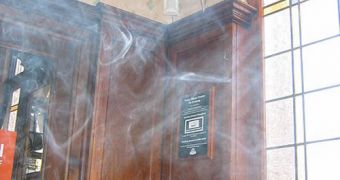According to the conclusions of a new scientific study, it would appear that non-smoking individuals who are exposed to secondhand smoking tend to be exposed to high-enough doses of nicotine to raise their risk of becoming addicted to the substance.
The new discoveries come on the heels of another major finding, which is that smokers tend to crave more cigarettes as soon as they are exposed to secondhand smoking. The data also adds to a growing body of evidence showing the dangers of inhaling other people's smoke.
Investigators conducted this new study by using a brain-imaging technique called positron emission tomography (PET). The funding necessary for their work came from the National Institute on Drug Abuse (NIDA), a part of the US National Institutes of Health (NIH).
In the new study, experts analyzed the spread of cigarette smoke in an enclosed space, over the course of an hour. Measurements conducted on the brains of both smokers and non-smokers in the room determined that the nicotine receptors in their brain were activated by the nicotine in the air.
In other words, nicotine in smoke caused the same level of receptor activation as direct exposure to nicotine (such as the one obtained through smoking) did. These results add to those of previous studies, which determined that kids exposed to smoke tend to pick up smoking more often than their peers.
“These results show that even limited secondhand smoke exposure delivers enough nicotine to the brain to alter its function,” explains Nora D. Volkow, MD, the director of NIDA.
“Chronic or severe exposure could result in even higher brain nicotine levels, which may explain why secondhand smoke exposure increases vulnerability to nicotine addiction,” the expert goes on to say.
The results of this investigation are very important, considering that official statistics from the US Centers for Disease Control and Prevention (CDC) indicate that around 50,000 Americans lose their lives on account of smoking every year.
Details of the new investigation appear in the latest issue of the medical journal Archives of General Psychiatry, PsychCentral reports.
“This study gives concrete evidence to support policies that ban smoking in public places, particularly enclosed spaces and around children,” explains scientist Arthur Brody, MD.
The expert, who was the corresponding author of the new research, is based at the University of California in Los Angeles (UCLA) Department of Psychiatry & Biobehavioral Sciences.

 14 DAY TRIAL //
14 DAY TRIAL //